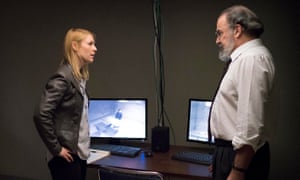The rumours have been circling for a while, but it now seems that a final decision has been made. Claire Danes this week confirmed that Homeland’s eighth season would be its last. For many, this announcement will be greeted with nothing more than the Alan Partridge shrug gif. After all, everyone knows that watching Homeland stopped being a thing with the exit of Nicholas Brody, played by Damian Lewis, dangling 100ft in the air from a crane. Some even stopped watching at the end of season one, apparently appalled at Brody’s failure to assassinate the president and his cabinet when he had both proximity and a perfectly good suicide vest on his side. Homeland, the story runs, is old news.
I submit that this is fake news. The truth is, a few wobbles aside, Homeland has maintained a high standard throughout its run. It is true that the chemistry between Danes’ brilliant but erratic Carrie Mathison and Lewis’s damaged beyond repair Brody was spectacular. It’s also true that very few shows could survive the exit of such a compelling figure as Brody. In Homeland’s case, though, Brody leaving was the making of it, forcing it to be recalibrated as an intense, thrill-a-minute roller coaster ride.
It also retained an almost spooky relevance. Indeed, Homeland’s ability to mirror current world events is unrivalled in TV. Right from the start, events such as the mysterious circumstances of Bowe Bergdahl’s captivity were described by CNN as being “straight out of a Homeland episode” and the media delighted in pointing out similarities between his case and Brody’s. In season five, an attack on a European capital chillingly echoed the Paris attacks that took place that very same month. Then, in season six, an embattled president-elect at war with the National Security establishment offered an eerie parallel with President Trump’s woes. For a show that frequently took liberties with plausibility, it had an uncanny knack of looking like the real world.
This was no accident. The show’s consultant, John MacGaffin, is a former CIA station chief. Each year before production begins, he brings together the Homeland writing team, along with Claire Danes and her fellow star Mandy Patinkin, and they conference together with intelligence professionals to get a sense of what their concerns are and what may be the big topics in the coming year.

It’s due diligence such as this that has kept the show meaningful. Homeland began in the middle of Obama’s first term, in a world that now seems like a different century. Back then, the idea of a White House with a reality-TV star incumbent would have been laughed out of even the most outlandish writers’ meeting (and Homeland has had a few of those). That the show has managed to predict so much of the changes ahead of time is testament to its research and its purpose beyond the magical Carrie and Brody relationship. Homeland never needed a doomed romance to justify our love.
Although it is still one of the better dramas on TV, I can accept that the cracks are starting to show. The generally strong current season has been hampered by an all-too-familiar subplot involving Carrie going off her meds and off the rails. Storylines repeat themselves first as tragedy, then as farce, and even though Danes is an actor gifted enough to sell anything, it’s hard to escape the sense that the show might be running out of ideas.
Similarly, there are only so many times her lovers can die in horrible circumstances before it starts losing emotional impact. She is now statistically a more dangerous girlfriend than Downton Abbey’s Lady Mary, and when you’re in that company, self-parody is never far away.
So the timing is right. I don’t ever want Homeland to be that washed-up pug, convinced that they’ve got one last fight left in them. . And as berserk and implausible as it often was, it will still go out feeling more realistic than the clown show currently playing out on the world stage.